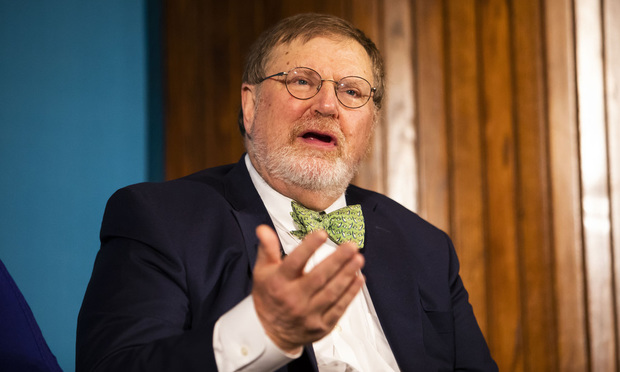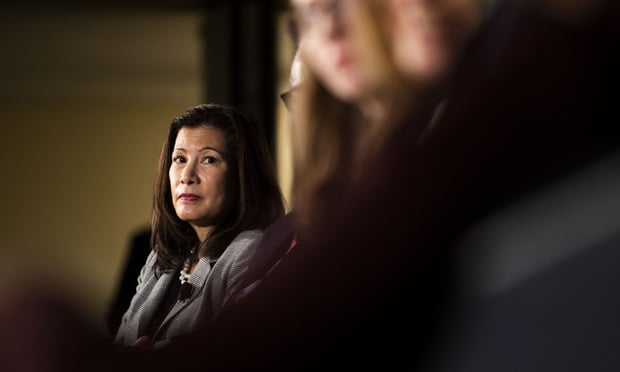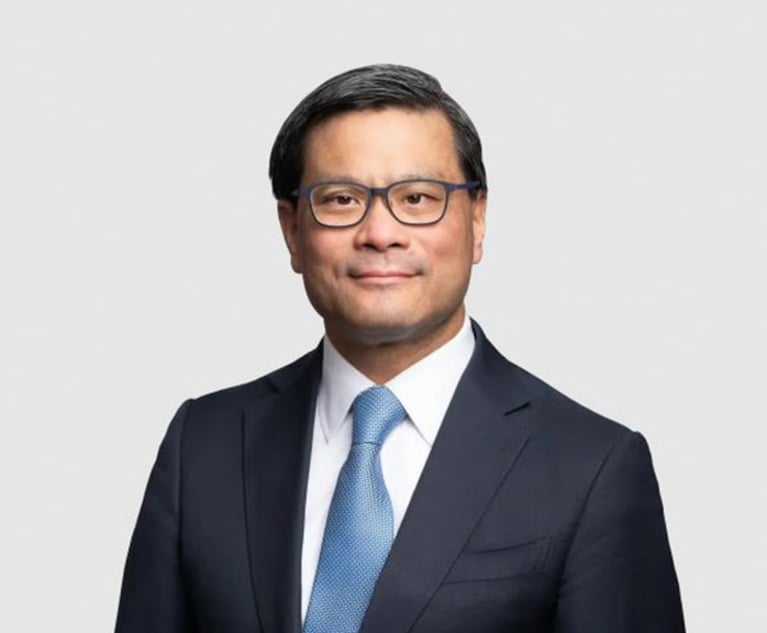Judges, Including California's Chief Justice, Push Back at Trump's Anti-Judiciary Rhetoric
"How can you defy the president?" said U.S. District Judge James Robart at an event organized by The National Judicial College, at the Press Club building in Washington, D.C. "That's what my job is—to be sure the Constitution is followed. If that means telling the president he is wrong, that is what I am supposed to do."
December 13, 2018 at 05:09 PM
6 minute read
The original version of this story was published on National Law Journal
 James Robart, senior judge of the U.S. District Court for the Western District of Washington, discusses threats to judicial independence Thursday in Washington. (Photo: Diego M. Radzinschi /ALM)
James Robart, senior judge of the U.S. District Court for the Western District of Washington, discusses threats to judicial independence Thursday in Washington. (Photo: Diego M. Radzinschi /ALM)
Federal and state judges on Thursday criticized the disparagement of the judiciary by President Donald Trump and others and urged lawyers, journalists and the public to defend and better understand what they do.
Speaking at a National Judicial College forum in Washington, retired federal appeals judge Andre Davis said, “One cannot overstate the concern we should all have over what is going on in this country in respect to the undermining effects” of criticism of judges by Trump and others.
“One exhausts one's inventory of adjectives to describe the indecency, the corrosive effect of democratic values and principles by seeing what is going on in this country,” Davis said.
Davis said that when political leaders disobey the law and criticize the courts, those sentiments are “felt all the way down” throughout society, undermining trust in the courts and the law.
Referring specifically to Trump, the former judge on the U.S. Court of Appeals for the Fourth Circuit said, “This presidency has been brought to you by Barnum and Bailey. But the consequences are far more serious than we should allow to go unchecked.”
Other judges were less direct than Davis, who said his retirement last year resulted in “restoration of my First Amendment rights” to speak out. Davis is now serving as the Baltimore city solicitor.
But other judges on the panel, including federal district court judge James Robart of the Western District of Washington, made it clear they felt the disparagement of federal judges distorts and mischaracterizes the role of the judiciary.
In 2017, Robart was the target of Trump's tweets during litigation over the so-called travel ban. When Robart granted a temporary restraining order against the executive order imposing the ban, Trump called him a “so-called judge” and later said that if terrorists came into the United States, “blame it on the judge.”
Robart said Thursday he has no problem with the president or anyone else criticizing his decisions. But he added, “It's different when you say 'so-called judge,' because what happens next is that 'so-called judge' is interpreted as … you are not a judge, you have no authority to do this. You must be stopped.”
The opinion of this so-called judge, which essentially takes law-enforcement away from our country, is ridiculous and will be overturned!
— Donald J. Trump (@realDonaldTrump) February 4, 2017
In addition to more than 100 death threats, Robart said he received many emails and other communications that indicated how little the public knows about the role of judges
Some said, “How can you defy the president?” Robart said. “That's what my job is—to be sure the Constitution is followed. If that means telling the president he is wrong, that is what I am supposed to do.”
Others, apparently unaware that federal judges are appointed for life, threatened that when Robart “runs for re-election,” they would vote against him. “People would say 'the president got 38 million votes, how many did you get?' My answer is 99,” Robart said, the number of votes the Senate cast in 2004 when he was confirmed to the bench.
 Tani Cantil-Sakauye, Chief Justice of California, discussing threats to judicial independence during a panel discussion titled ““Undermining the Courts and the Media: The Consequences for American Democracy,”” organized by The National Judicial College, at the Press Club building in Washington, D.C., on Thursday, December 13, 2018. (Photo: Diego M. Radzinschi/ALM)
Tani Cantil-Sakauye, Chief Justice of California, discussing threats to judicial independence during a panel discussion titled ““Undermining the Courts and the Media: The Consequences for American Democracy,”” organized by The National Judicial College, at the Press Club building in Washington, D.C., on Thursday, December 13, 2018. (Photo: Diego M. Radzinschi/ALM)That lack of civic knowledge and what to do about it was another theme during the discussion Thursday. California Chief Justice Tani Cantil-Sakauye said judges, as well as lawyers and the media, need to be more proactive in spreading the word about the judiciary.
She spoke of a new k-12 program in California aimed at “making the judiciary a major part of civics education,” including participation by judges themselves in the curriculum.
Another way to combat political attacks on the judiciary, she said, was for judges to be more public and develop relationships with legislators, in part to inform debates over the judicial branch's budget, but also to ensure that “before they demean you, they know you.”
A perennial complaint was leveled at the news media for identifying the party of the president who appointed a judge. “You label us in a partisan way,” said retired federal judge Shira Scheindlin of the Southern District of New York. When doing their day-to-day work of decision-making, she said, “We don't think about the president who appointed us.”
Chief Justice John Roberts Jr. took a rare step recently in rebuking Trump, after the president said an “Obama judge” had ruled against the administration's effort to restrict asylum.
“We do not have Obama judges or Trump judges, Bush judges or Clinton judges,” Roberts said. “What we have is an extraordinary group of dedicated judges doing their level best to do equal right to those appearing before them. That independent judiciary is something we should all be thankful for.”
Read more:
Chief Justice Roberts Rebuffs Trump After He Criticizes Judges Again
Not All Trump Court Nominees Get Confirmed: Thomas Farr Edition
Jeff Sessions Inveighs Against Federal Judges in Heritage Foundation Speech
Former SCOTUS Clerks Dominate the Ranks of Trump's Judicial Nominees
Democrats Pressed 36-Year-Old Circuit Pick on 'Life Experience'
This content has been archived. It is available through our partners, LexisNexis® and Bloomberg Law.
To view this content, please continue to their sites.
Not a Lexis Subscriber?
Subscribe Now
Not a Bloomberg Law Subscriber?
Subscribe Now
NOT FOR REPRINT
© 2025 ALM Global, LLC, All Rights Reserved. Request academic re-use from www.copyright.com. All other uses, submit a request to [email protected]. For more information visit Asset & Logo Licensing.
You Might Like
View All
Elevate Acquires Intellectual Property Research Provider Sagacious IP
3 minute read
As Nonprofits Plead for Answers, Dem AGs Plan Suit to Block Trump Funding Freeze
4 minute read
ArentFox Schiff Adds Global Complex Litigation Partner in Los Angeles

Trending Stories
- 1Class Action Litigator Tapped to Lead Shook, Hardy & Bacon's Houston Office
- 2Arizona Supreme Court Presses Pause on KPMG's Bid to Deliver Legal Services
- 3Bill Would Consolidate Antitrust Enforcement Under DOJ
- 4Cornell Tech Expands Law, Technology and Entrepreneurship Masters of Law Program to Part Time Format
- 5Divided Eighth Circuit Sides With GE's Timely Removal of Indemnification Action to Federal Court
Who Got The Work
J. Brugh Lower of Gibbons has entered an appearance for industrial equipment supplier Devco Corporation in a pending trademark infringement lawsuit. The suit, accusing the defendant of selling knock-off Graco products, was filed Dec. 18 in New Jersey District Court by Rivkin Radler on behalf of Graco Inc. and Graco Minnesota. The case, assigned to U.S. District Judge Zahid N. Quraishi, is 3:24-cv-11294, Graco Inc. et al v. Devco Corporation.
Who Got The Work
Rebecca Maller-Stein and Kent A. Yalowitz of Arnold & Porter Kaye Scholer have entered their appearances for Hanaco Venture Capital and its executives, Lior Prosor and David Frankel, in a pending securities lawsuit. The action, filed on Dec. 24 in New York Southern District Court by Zell, Aron & Co. on behalf of Goldeneye Advisors, accuses the defendants of negligently and fraudulently managing the plaintiff's $1 million investment. The case, assigned to U.S. District Judge Vernon S. Broderick, is 1:24-cv-09918, Goldeneye Advisors, LLC v. Hanaco Venture Capital, Ltd. et al.
Who Got The Work
Attorneys from A&O Shearman has stepped in as defense counsel for Toronto-Dominion Bank and other defendants in a pending securities class action. The suit, filed Dec. 11 in New York Southern District Court by Bleichmar Fonti & Auld, accuses the defendants of concealing the bank's 'pervasive' deficiencies in regards to its compliance with the Bank Secrecy Act and the quality of its anti-money laundering controls. The case, assigned to U.S. District Judge Arun Subramanian, is 1:24-cv-09445, Gonzalez v. The Toronto-Dominion Bank et al.
Who Got The Work
Crown Castle International, a Pennsylvania company providing shared communications infrastructure, has turned to Luke D. Wolf of Gordon Rees Scully Mansukhani to fend off a pending breach-of-contract lawsuit. The court action, filed Nov. 25 in Michigan Eastern District Court by Hooper Hathaway PC on behalf of The Town Residences LLC, accuses Crown Castle of failing to transfer approximately $30,000 in utility payments from T-Mobile in breach of a roof-top lease and assignment agreement. The case, assigned to U.S. District Judge Susan K. Declercq, is 2:24-cv-13131, The Town Residences LLC v. T-Mobile US, Inc. et al.
Who Got The Work
Wilfred P. Coronato and Daniel M. Schwartz of McCarter & English have stepped in as defense counsel to Electrolux Home Products Inc. in a pending product liability lawsuit. The court action, filed Nov. 26 in New York Eastern District Court by Poulos Lopiccolo PC and Nagel Rice LLP on behalf of David Stern, alleges that the defendant's refrigerators’ drawers and shelving repeatedly break and fall apart within months after purchase. The case, assigned to U.S. District Judge Joan M. Azrack, is 2:24-cv-08204, Stern v. Electrolux Home Products, Inc.
Featured Firms
Law Offices of Gary Martin Hays & Associates, P.C.
(470) 294-1674
Law Offices of Mark E. Salomone
(857) 444-6468
Smith & Hassler
(713) 739-1250






